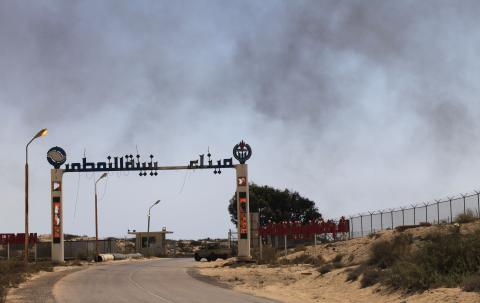Advertisement
Libya Army Says It Has No Orders To Move Against Seized Oil Ports
TRIPOLI (Reuters) - Libya's armed forces have not received orders from Prime Minister Ali Zeidan to move against eastern oil ports and use force to end a six-month blockade there by protesters, an army spokesman said.
Zeidan on Monday repeated a warning he may turn to force, and said he ordered the defense ministry weeks ago to move armed forces to the eastern ports, where the protests have cut off around 600,000 barrels per day of crude exports.
The army said on Tuesday that no orders had come though and no troops had been deployed to confront the former state oil security guards who defected in August and took control of the Ras Lanuf, Es Sider and Zuetina ports as part of a wider group seeking more regional autonomy
"We didn't receive any orders from the Ministry of Defence or from the prime minister himself about moving toward the occupied fields," army spokesman Ali Alsheikhi said.
"If we receive any orders, the matter will be studied at that time."
With its fragile state still in flux two years after the fall of Muammar Gaddafi, Libya is struggling with internal conflicts among institutions that are often affiliated to different factions or rival brigades of former rebels.
Since the oil port dispute began, Zeidan and the protest leader, former rebel commander Ibrahim al-Jathran, have also both issued threats and warnings that analysts say are often just positioning for leverage.
After six months of blockade, Libya's state finances have been dented by the loss of vital oil revenues.
Zeidan is under pressure to resolve the port dispute and bolster legitimacy for a government that struggles to provide stability.
Using force may also prove risky. Libya's army is still in the early stages of training. The armed forces often cannot assert their influence over former rebels, Islamist militants and militia commanders who control parts of the country.
Jathran himself has promised to sell Libya's crude independently of Tripoli in his quest to demand more autonomy in the east, where many people are frustrated over their gains from the revolution and want a greater share of oil wealth.
Despite his backing from heavily armed former oil guards at the port, Jathran's support may be waning in the east. Some tribal leaders already dismiss him a power-hungry warlord trying to bully his way into Libyan politics.
Analysts expect a negotiated settlement is more likely than an attempt to end the protest by force.
Federalist leaders say they are closer to an agreement now with Zeidan's government over key demands for lifting their blockade.
(Reporting by Ghaith Shennib; Writing by Patrick Markey; Editing by Anthony Barker)



















Add new comment